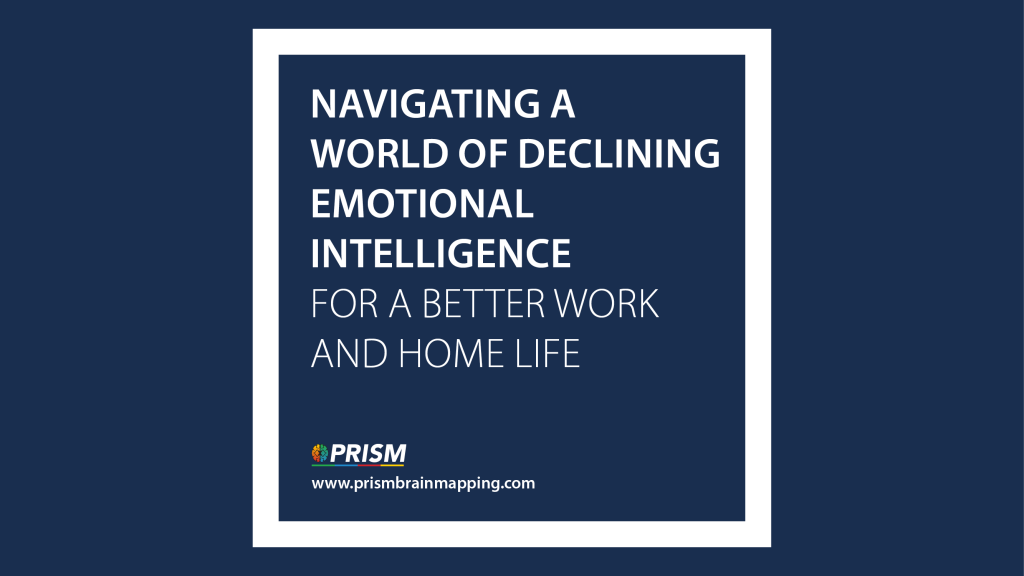In today’s fast-paced world, Emotional Intelligence (EI) has become a critical skill in both professional and personal life. New research reveals a concerning trend: global EI levels have been steadily declining for four consecutive years. According to Joshua Freedman, CEO of Six Seconds,
“People are more volatile; less likely to be able to navigate emotions, less empathetic, and
less capable of identifying their feelings, which are essential to emotional and mental health.”
As this trend continues, it raises important questions about the role of EI in our lives.
The decline in global EI levels impacts how people navigate stress, communicate with others, and build meaningful relationships. As emotional intelligence decreases so too does emotional resilience, empathy, and connection with a sense of purpose.
The reasons for the decline are multifaceted. The pressures of modern life, the constant connectivity of digital tools, and the global uncertainty have all contributed to this downturn in emotional health. When people struggle to identify and label their feelings, they are less likely to process them effectively, leading to poorer mental health outcomes and strained relationships.

What is Emotional Intelligence?
Emotional intelligence is the ability to recognize, understand, and manage our own emotions while also recognising and influencing the emotions of others. This encompasses four main components:
1. Self-awareness – Understanding your own emotions.
2. Self-management – The ability to regulate your emotions and adapt your behaviour accordingly.
3. Awareness of others – Empathy and understanding others’ emotional states.
4. Relationship management – Navigating social complexities, influencing others, and managing conflict.
In professional settings, emotional intelligence plays a vital role in building collaborative teams, navigating leadership challenges, and improving job performance.

Leaders with high emotional intelligence can:
– Build stronger relationships with team members by understanding their emotions and needs.
– Enhance productivity by fostering a positive and empathetic work environment.
– Manage conflicts more effectively by addressing the emotions behind the issues.

A lack of emotional intelligence in the workplace can lead to miscommunication, disengagement, and high turnover. When employees are not equipped to handle emotional challenges, their stress levels increase, which can affect overall performance and job satisfaction.
While much focus is often placed on emotional intelligence in the workplace, its role in home life is equally essential. Family dynamics can be complex, and navigating personal relationships requires a high degree of empathy, self-regulation, and social awareness. Emotional intelligence helps individuals:
– Understand and manage their reactions to family stressors, such as balancing work-life demands or dealing with disagreements.
– Cultivate deeper connections with family members by truly understanding their emotional states.
– Reduce the likelihood of emotional outbursts or miscommunication by being more attuned to their own emotional triggers and those of their loved ones.

PRISM and Emotional Intelligence
While EI helps individuals understand and manage emotions, PRISM goes a step further by offering a neuroscientific approach to human behaviour. PRISM doesn’t measure personality; it measures self-expressed and observed behavioural preferences, acknowledging that personality is just one factor among many that influence behaviour.
This is crucial because PRISM helps individuals understand not only their natural or instinctive behaviour but also how they adapt this based on different situations—such as work or home life. Unlike many psychometric tests, PRISM is based on decades of cumulative research in neuroscience, highlighting the dynamic nature of behaviour.
The combination of PRISM and emotional intelligence offers a powerful toolkit for personal growth. Here’s how individuals can enhance their emotional intelligence using insights from PRISM:
- Increase self-awareness through reflection on both emotional and behavioural patterns.
- Practice self-regulation by recognizing when your natural behavioural preferences are being over- or underutilised.
- Cultivate empathy by using PRISM’s insights to understand how your behaviour affects others.
- Adapt behaviour to context by applying both emotional intelligence and PRISM’s understanding of situational flexibility.
- Engage in feedback and mindfulness to stay in tune with emotional and behavioural shifts over time.
Conclusion
The global decline in emotional intelligence signals a pressing need for individuals to develop greater self-awareness, empathy, and behavioural adaptability. PRISM provides an invaluable tool for understanding not only our emotions but also the behavioural preferences that influence our actions. Together, emotional intelligence and PRISM help individuals navigate life’s complexities, leading to better relationships, improved well-being, and success both at work and home.

